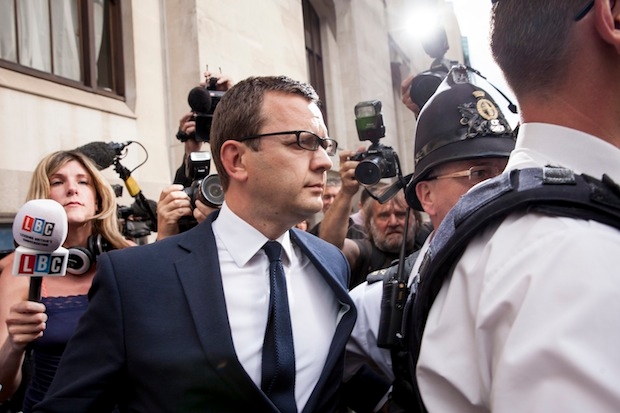We have not heard much from Hugh Grant this week. Nor from Max Mosley, Steve Coogan or any of the other bizarre array of celebrities and moguls who wanted to use the phone-acking scandal as an excuse to end British press freedom. For some time, they argued that the press had become a law unto itself, and it was time for politicians to regulate it. We have just seen why such a draconian step is not necessary.
Hacking is already against the law, which is why £100 million has just been spent trying former executives of Rupert Murdoch’s News International. The woman who used to run the company, Rebekah Brooks, has been acquitted of all charges — after being investigated and scrutinised for three years solidly. Andy Coulson, a former News of the World editor, was convicted. Hardly a sign of a country where, as the Hacked Off campaigners have suggested, newspapers operate above the law.
David Cameron has said he is ‘very sorry’ for hiring Coulson as his spin doctor, and no wonder. Had he not brought him into 10 Downing Street, it’s unlikely that there would have been such interest in reopening the hacking case. It was investigative journalism that exposed the wrongdoing — the free press revealing flaws in other parts of the free press. Like MPs’ expenses, phone hacking was a scam justified in the belief that everyone else was doing it.
It is now clear to everyone that Cameron, himself a former PR man, ought to have asked more questions before hiring Coulson. But at the time, in the summer of 2007, Cameron was desperate. It looked as if a general election was about to be called, which probably would have ended in the Conservatives’ defeat and his resignation as party leader. At the time, senior Tories were talking about the ‘successor movement’ to a party which looked like it was about to take its last throw of the dice. Gordon Brown decided not to hold that election because the Tory party smartened up its act quickly, swapping ‘hug-a-hoodie’ waffle for serious promises of tax cuts. Coulson played a full part in this recovery.
So it’s easy to understand why Cameron did not probe too deeply into the extent of hacking in the tabloid newspaper world — perhaps a bit of him simply did not want to know. But in all the scrutiny of his behaviour, there has been nothing to suggest that Coulson acted anything but honourably throughout his time in government. Had Cameron hired someone such as Damian McBride, a character assassin who lay at the heart of Gordon Brown’s government, he would have a far bigger apology to make.
Ed Miliband is, technically, right to say that Cameron’s ‘hand-picked adviser was a criminal’. But Coulson is a criminal who behaved like a gentleman. McBride broke no law but behaved criminally. So let us not pretend that this exposes corruption at the heart of the Tory party, or that it has any wider party-political ramifications. We have now had four years of Cameron’s government, and have had much time to study its defects. Hiring poisonous spin doctors is not one of them.
The Metropolitan Police has rather more questions to answer, having spent so much time and money investigating what now looks like something rather less than the crime of the century. The Met seemed to react in panic — perhaps induced by the knowledge that they had been operating hand-in-glove with certain journalists for far too long, and were about to be rumbled. Like the Crown Prosecution Service, the police appear to have been swept away by the wave of hysteria.
It has suited Rupert Murdoch’s commercial opponents (including the BBC) to portray hacking as an evil which sprang from the blackness of his Australian heart. But it has steadily become clear that it was going on across the newspaper industry, in Britain and abroad. Hacking the voicemail of the murdered schoolgirl Milly Dowler was indeed deplorable. But such crimes are now detected and punished: the newspaper responsible has been closed and its former editor faces jail. No new laws are needed: the existing ones have seen 40 journalists arrested.
All but 13 members of parliament voted for a Bill to end press freedom. Mercifully, this ‘Royal Charter’ has been ignored, as the press has instead declined to be regulated by politicians and retains its independence as it continues what is, for many, a fight for survival. Newspapers have lost more than a third of their circulation since the hacking scandal erupted. Each day, 1,500 people stop buying newspapers and never start again.
Rather than being too strong, the press is weaker now than at any time in modern history. This was the ideal time for the enemies of press freedom to pounce. Luckily, the threat has been seen off, the law is being allowed to run its course and press freedom has been conserved. This is about the only comfort to be drawn from an episode which has reflected so badly on so many.






Comments